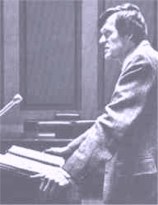|
Speech
(From "Transcript of Proceedings of Presentation of Papers Relating to the Professional, Public and Judicial Career of C. Donald Peterson")
JUSTICE LAWRENCE YETKA: ...The next speaker, Burton Hanson, is a former law clerk of Judge Peterson's. He was encouraged to stay on as a commissioner and he is still here. Burt is a graduate of the Harvard Law School and handles much of the research work on difficult criminal matters. He is one of the recognized experts in the country in this field. At this time I would like to call on Mr. Hanson.
 BURTON R. HANSON: May it please the court. I suspect that there are some people here, many probably, who have seen the play The Magnificent Yankee. It is a very sentimental, biographical drama, primarily about the relationship of Justice Holmes and his wife, Fannie, during his years on the United States Supreme Court. But the play is also very much about Holmes' relationship with his law clerks. There are a number of memorable scenes in the play involving the law clerks, but the most memorable one occurs fairly late in the play. I know that Judge Peterson remembers this because we talked about it once. BURTON R. HANSON: May it please the court. I suspect that there are some people here, many probably, who have seen the play The Magnificent Yankee. It is a very sentimental, biographical drama, primarily about the relationship of Justice Holmes and his wife, Fannie, during his years on the United States Supreme Court. But the play is also very much about Holmes' relationship with his law clerks. There are a number of memorable scenes in the play involving the law clerks, but the most memorable one occurs fairly late in the play. I know that Judge Peterson remembers this because we talked about it once. The scene takes place on a Sunday night in 1921 two days before Holmes' 80th birthday. Fifteen of Holmes' law clerks, each of them in white tie and tails, hide in the cellar of Holmes' house. Then at the appropriate moment Mrs. Holmes signals them and they come out with champagne bottles in their hands and start singing "Happy Birthday" in perfect harmony. And then Justice Holmes, who had no children of his own, gives a very sentimental talk in which he refers to his law clerks as his "sons-at-law". If Holmes were alive today he would not be saying "sons-at-law." He would...be saying "sons and daughters at law" or, as Chief Justice Amdahl has put it so nicely, "sons and daughters of the Supreme Court family."
Justice Peterson had 23 law clerks -- fifteen men and eight women from ten different law schools -- in his 19 years on the Minnesota Supreme Court. Fourteen of us live and work here in the Twin Cities; the other nine are living and working in seven other major cities, New York City, Boston, Washington D.C., Dallas, Los Angeles, Seattle and Omaha. All 23 of us are proud to be a part of the Supreme Court family and particularly proud to be a part of the Peterson branch of the Supreme Court family. We have never worn white ties and tails or hidden in any cellars with bottles of Prohibition champagne in our hands or serenaded the Judge in perfect harmony, but we get together every year with the Judge and Mrs. Peterson more or less formally and the affection that we have for both of them is the same as that depicted in the play.
Each of Judge Peterson's law clerks would have some unique things to say if he or she were up here instead of me. One of them who is here today, Terry Slye, who is with the Briggs and Morgan law firm, might tell you, among many other things, about what he has come to refer to with increasing nostalgia over the years as "the great potato case," an appeal after several months of trial concerning an improperly-constructed potato storage warehouse. Terry spent many, many hours working on that case, read thousands of pages of trial transcript and learned more about potatoes than he ever thought was possible to learn about potatoes. Then he put all that knowledge and wisdom into a bench memo totaling approximately 100 pages, one of the longest bench memos in the history of the Minnesota Supreme Court, only to see Judge Peterson and the other Judges dispose of the case summarily without written opinion.
Another law clerk, Dick Dahlen, who is practicing in Boston and who has been known to fly back for our annual get together, might tell you about the time that Judge Peterson asked him to write a proposed opinion. Judge Peterson used to have a practice of each year letting the law clerk write one opinion and Judge Peterson would say, "If you do a real good job on this, I'll sign it just as it is without changing a word." Well Judge Peterson asked Dick Dahlen to write a proposed opinion on a fairly simple cat-bite case and told him he would sign it if it was good enough. Dick spent hours and hours researching and writing a long detailed opinion about the history of cat-bite cases going back to the Dark Ages, with many, many footnotes and so on. If Dick were here today he would tell you, as he has told many of us at law clerk get-togethers, what a good sport Judge Peterson was to stick to his promise and publish that opinion, because it was not the kind of opinion that Judge Peterson usually wrote.
Still another law clerk, Richard Krantz, who is practicing in New York City, might talk not about cases but about the fun side of working with Judge Peterson. In particular he might tell you about the time he and Judge Peterson played a practical joke on Mrs. Peterson. In fact, Rich refers to this incident in his written tribute to Judge Peterson, which is by the way one of a number of law clerk tributes to Judge Peterson appearing in the book. Rich writes, "I will never forget the time that, at Justice Peterson's urging, I took on the role of the subscription manager for a Minneapolis newspaper and called Mrs. Peterson to complain about her husband's rude and insulting behavior." I don't know all the details of this story but maybe Judge Peterson or Mrs. Peterson will tell us more about that sometime.
One thing that all of the clerks would agree with me on is that our year here at the Court with Judge Peterson was primarily, at least for us, a year of learning. When I started out as a clerk in the fall of 1970 Chief Justice Oscar Knutson told me and all the other new law clerks that year that our year at the Court was going to be "a year of post-graduate legal education in the judicial process at state expense," and that's exactly what it was. Judge Peterson taught me and the other clerks in many different ways. He did not teach by precept or admonition. Instead he taught us by giving us responsibility; by praising us when praise was due; by not ridiculing us when we said ridiculous things, which was often; by encouraging us when we needed encouragement; by treating us as adults and as professionals, even though we were novices in fact; by giving us the freedom to do our best; by treating us not as mere clerks but as colleagues whose work was essential to the proper functioning of the court; by being gentle and patient with us; and, most of all, he taught us simply by being himself and by setting a good example for us.
There is an interesting essay by Professor Thomas Schaffer of the Notre Dame Law School, in Volume 18 of the St. Mary's Law Review, entitled "The Profession as Moral Teacher." I thought of Judge Peterson when I read the essay, because Judge Peterson was and is to each of us not just a great teacher of law but a great moral teacher, who wants each of his clerks to be not just a better lawyer but a better person. So that you will know what I mean, I would like to identify in passing, without going into any detail at all, just a very few of the many, many lessons that Judge Peterson taught us. Judge Peterson taught us, and the other judges of the Court also taught us, that it is possible for people, even lawyers, to disagree in a civil and creative way without being rancorous and without getting personal. Judge Peterson showed us that just because the law is a serious business it doesn't mean that we have to go around all day with somber expressions on our faces. Judge Peterson taught us about the power of positive thinking. He taught us -- this is probably one of the main lessons that he taught us -- that it is possible, although not easy, to live a balanced life in the law and that it is just as important to succeed personally as it is to succeed professionally.
And so in closing, Judge, we want you to know that we are grateful to you for the many opportunities that you gave us, for the lessons that you taught us, and for the hand of friendship that you extended to us.
Copyright (c) 2000 by Burton Randall Hanson - Prepared & published by candidate on his own behalf and at his own expense. Candidate may be reached by e-mail at BRH@CampaignWebSiteURL or by mail at address listed on Secretary of State's website.
|

 BURTON R. HANSON: May it please the court. I suspect that there are some people here, many probably, who have seen the play The Magnificent Yankee. It is a very sentimental, biographical drama, primarily about the relationship of Justice Holmes and his wife, Fannie, during his years on the United States Supreme Court. But the play is also very much about Holmes' relationship with his law clerks. There are a number of memorable scenes in the play involving the law clerks, but the most memorable one occurs fairly late in the play. I know that Judge Peterson remembers this because we talked about it once.
BURTON R. HANSON: May it please the court. I suspect that there are some people here, many probably, who have seen the play The Magnificent Yankee. It is a very sentimental, biographical drama, primarily about the relationship of Justice Holmes and his wife, Fannie, during his years on the United States Supreme Court. But the play is also very much about Holmes' relationship with his law clerks. There are a number of memorable scenes in the play involving the law clerks, but the most memorable one occurs fairly late in the play. I know that Judge Peterson remembers this because we talked about it once.